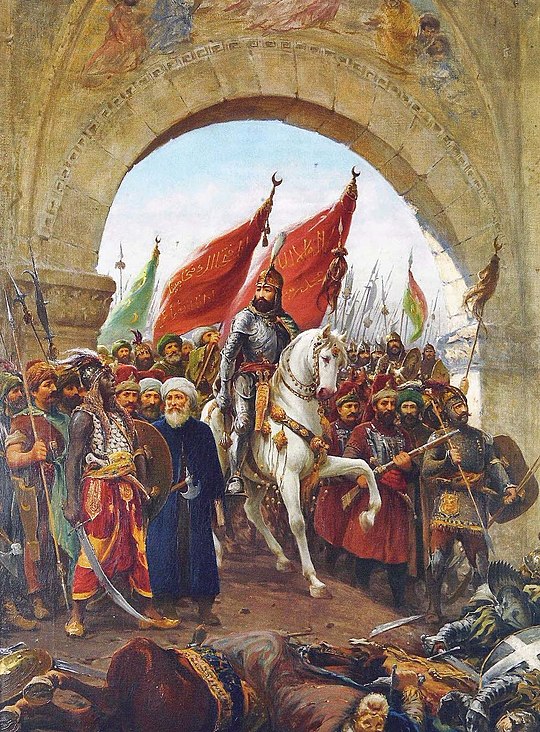1453 The Fall of Constantinople
Mehmed the Conquerer enters Constantinople
After successfully repelling attacks by Slavs, Persians, Avars, Vikings, Arabs, and Bulgars, the thousand-year-old walls of Constantinople were finally penetrated by the Ottoman Turks under Mehmed II. The last Byzantine Emperor, Constantine XI, died defending the city and with him perished the the last remnants of the Roman Empire.
For centuries that empire had been shrinking, losing the Middle East and Levant to the Arabs, southern Italy to the Normans, and Anatolia and the Balkans to the Turks. It was in financial peril, with its trade in the hands of Genoa and Venice; its crown jewels were glass (the real ones having been pawned); and the Catholic powers of Europe demanded that Constantinople abandon Orthodox Christianity before they would give any aid. Though its walls were still formidable, the city inside them was a shrunken husk of former glory, never having recovered from its sack at the hands of the Fourth Crusade in 1204.
Finally, the young Ottoman sultan, Mehmed II, decided to end the charade. He built a fort to cut off Constantinople from the Black Sea, and brought a huge army and fleet to besiege the city. Massive artillery bombarded the ancient walls, a fleet was hauled on rollers over the hills from the Bosporus to the Golden Horn, and miners tunneled under the fortifications. The vastly outnumbered defenders finally succumbed on May 29, 1453, whereupon Mehmed, ever after known as The Conqueror, gave the city over to three days of rape, massacre, and looting, and its inhabitants were sold into slavery. The great Church of Holy Wisdom, Hagia Sophia, was immediately turned into a mosque. The most sacred relic of eastern Christians, the Hodegetria, a portrait of Mary and the baby Jesus supposedly painted by Luke the Evangelist, was chopped into bits for the gold in its frame.
By that time, Constantinople, once the grandest city on the planet, was only a hollow shell of its former self and the Roman Empire, of which it had been its capital, was reduced to a few scattered holdings. But the capture of the city had enormous political and symbolic importance. Both the Turks and the Russians claimed to be the heirs of Byzantium. Mehmet styled himself the Kayser-i-Rum, “Roman Emperor” and decreed that his next conquest would be Rome itself. The ruler of Muscovy, Ivan III, married a Byzantine princess and declared that he was the successor of Orthodox supremacy, appropriating the title of Czar, or “Caesar”. The flood of exiles from the city who found refuge in Italy brought with them manuscripts and a knowledge of Greek that helped fuel a second stage in the Renaissance. Turkish expansion brought with it a strangling of the trade between Asia and Europe, encouraging Europeans to embark on direct voyages to the East rather than relying on Islamic middle men; the expeditions of Columbus and Vasco da Gama are results of the fall of Constantinople.
Today, visitors to Constantinople, called “Istanbul” by the Turks, can visit a tiny enclave in the Fener district by the Golden Horn and see the compound of the Patriarch of Constantinople, the last remaining official of the Roman Empire.
In recent years, the Islamist government of President Erdogan has made political capital out of the Conqueror and Turkey’s Ottoman past — television movies have been made about Mehmet II and his descendant Suleiman the Magnificent; a new bridge across the Bosporus has been named after Mehmet — all part of Erdogan’s plan to erase the nonsectarian republicanism of Ataturk.










